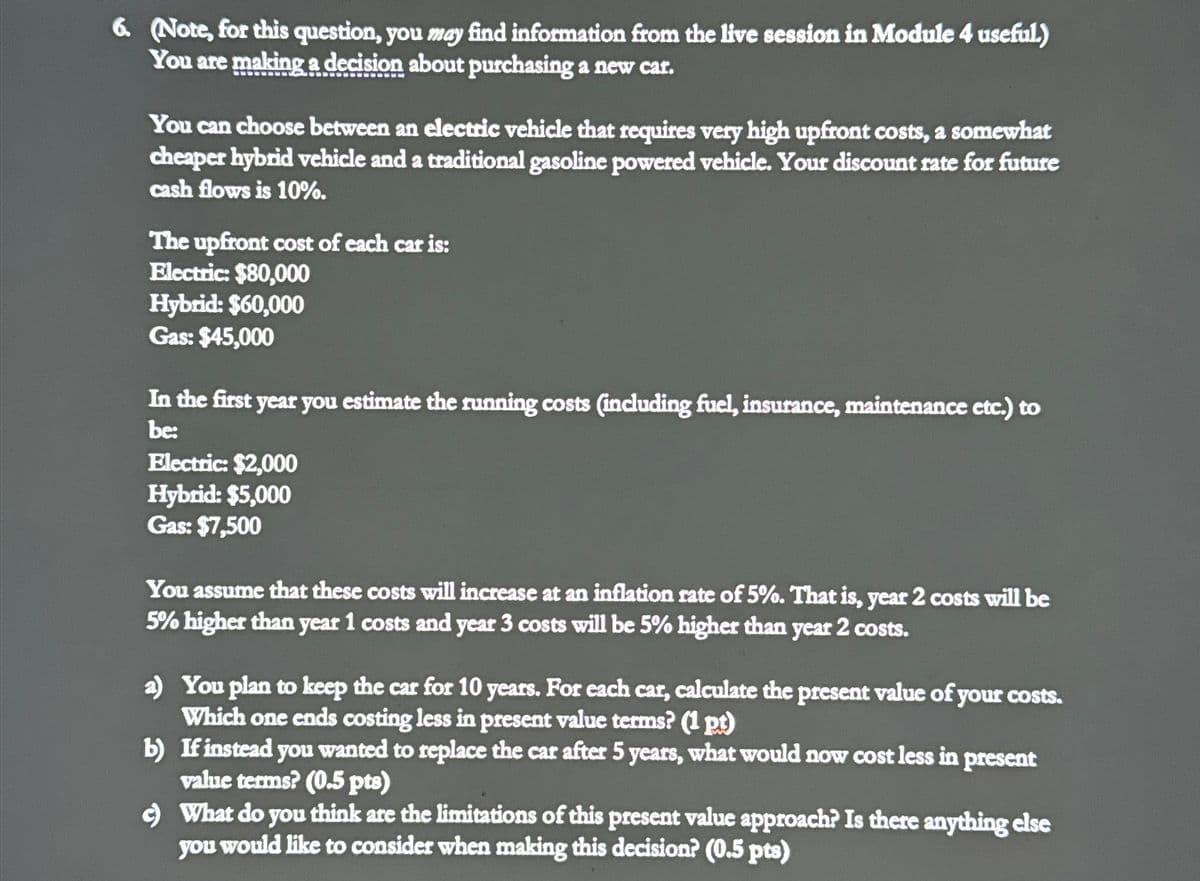6. (Note, for this question, you may find information from the live session in Module 4 useful.) You are making a decision about purchasing a new car. You can choose between an electric vehicle that requires very high upfront costs, a somewhat cheaper hybrid vehicle and a traditional gasoline powered vehicle. Your discount rate for future cash flows is 10%. The upfront cost of each car is: Electric: $80,000 Hybrid: $60,000 Gas: $45,000 In the first year you estimate the running costs (including fuel, insurance, maintenance etc.) to be: Electric: $2,000 Hybrid: $5,000 Gas: $7,500 You assume that these costs will increase at an inflation rate of 5%. That is, year 2 costs will be 5% higher than year 1 costs and year 3 costs will be 5% higher than year 2 costs. a) You plan to keep the car for 10 years. For each car, calculate the present value of your costs. Which one ends costing less in present value terms? (1 pt) b) If instead you wanted to replace the car after 5 years, what would now cost less in present value terms? (0.5 pts) c) What do you think are the limitations of this present value approach? Is there anything else you would like to consider when making this decision? (0.5 pts)
6. (Note, for this question, you may find information from the live session in Module 4 useful.) You are making a decision about purchasing a new car. You can choose between an electric vehicle that requires very high upfront costs, a somewhat cheaper hybrid vehicle and a traditional gasoline powered vehicle. Your discount rate for future cash flows is 10%. The upfront cost of each car is: Electric: $80,000 Hybrid: $60,000 Gas: $45,000 In the first year you estimate the running costs (including fuel, insurance, maintenance etc.) to be: Electric: $2,000 Hybrid: $5,000 Gas: $7,500 You assume that these costs will increase at an inflation rate of 5%. That is, year 2 costs will be 5% higher than year 1 costs and year 3 costs will be 5% higher than year 2 costs. a) You plan to keep the car for 10 years. For each car, calculate the present value of your costs. Which one ends costing less in present value terms? (1 pt) b) If instead you wanted to replace the car after 5 years, what would now cost less in present value terms? (0.5 pts) c) What do you think are the limitations of this present value approach? Is there anything else you would like to consider when making this decision? (0.5 pts)
Chapter3: Cost-volume-profit Analysis
Section: Chapter Questions
Problem 6PB: Karens Quilts is considering the purchase of a new Long-arm Quilt Machine that will cost $17,500 and...
Related questions
Question

Transcribed Image Text:6. (Note, for this question, you may find information from the live session in Module 4 useful.)
You are making a decision about purchasing a new car.
You can choose between an electric vehicle that requires very high upfront costs, a somewhat
cheaper hybrid vehicle and a traditional gasoline powered vehicle. Your discount rate for future
cash flows is 10%.
The upfront cost of each car is:
Electric: $80,000
Hybrid: $60,000
Gas: $45,000
In the first year you estimate the running costs (including fuel, insurance, maintenance etc.) to
be:
Electric: $2,000
Hybrid: $5,000
Gas: $7,500
You assume that these costs will increase at an inflation rate of 5%. That is, year 2 costs will be
5% higher than year 1 costs and year 3 costs will be 5% higher than year 2 costs.
a) You plan to keep the car for 10 years. For each car, calculate the present value of your costs.
Which one ends costing less in present value terms? (1 pt)
b) If instead you wanted to replace the car after 5 years, what would now cost less in present
value terms? (0.5 pts)
c) What do you think are the limitations of this present value approach? Is there anything else
you would like to consider when making this decision? (0.5 pts)
AI-Generated Solution
Unlock instant AI solutions
Tap the button
to generate a solution
Recommended textbooks for you

Principles of Accounting Volume 2
Accounting
ISBN:
9781947172609
Author:
OpenStax
Publisher:
OpenStax College

Principles of Accounting Volume 2
Accounting
ISBN:
9781947172609
Author:
OpenStax
Publisher:
OpenStax College